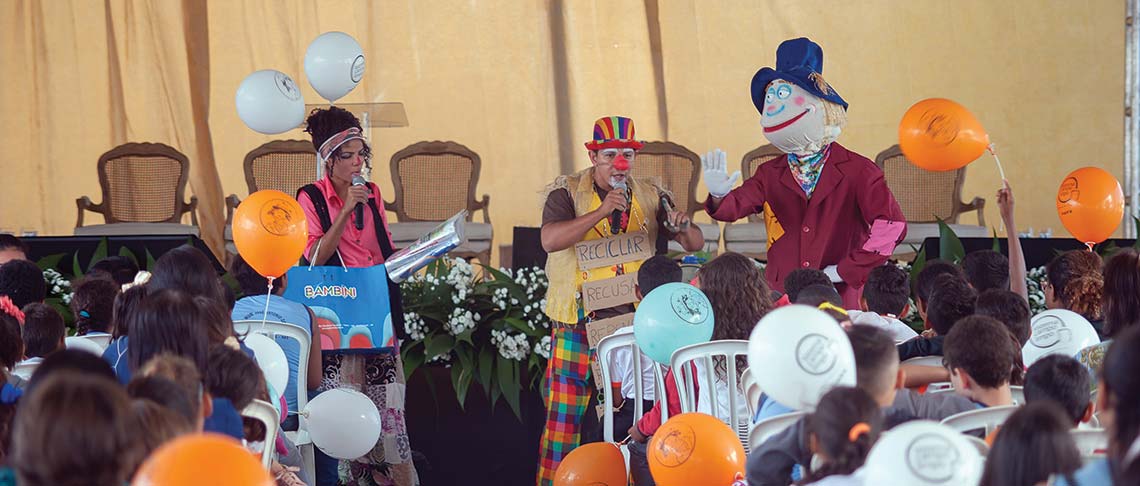As a representative of the crop protection industry regarding reverse logistics, the development and application of educational and awareness actions are part of inpEV’s activities since its foundation. The Communication and Education area is in charge of managing this topic, create educational materials, provide guidelines on its application and measure results. The main projects and results for 2018 follow:
National Clean Field Day (DNCL - Dia Nacional do Campo Limpo)
Since 2005, inpEV has celebrated the National Clean Field Day, an event that recognizes the importance of involving all links of the agricultural chain - farmers, distribution channels, manufacturers and government - to ensure the success of the Campo Limpo System. The National Clean Field Day has already gathered over one million people throughout Brazil since its creation.

In 2018, the inpEV central station in Rondonópolis, MT, hosted the 14th edition of the official event, and the central topic was “Shared Responsibilities, Celebrating Results!”. Alongside System representatives, this unit received authorities and people from surrounding communities, as well as around 350 children from municipal schools.
In addition to Rondonópolis, special actions were promoted during last year for this date in another 107 central stations of the System, in 22 states of Brazil, which counted with 77,000 participants, including authorities, community members, schools, universities, partners, producers, recyclers, among others. The units promoted entertaining and educational activities related to the System’s operations and environmental conservancy, besides including in the program local modalities of the celebration, such as the DNCL Open Doors; the DNCL Solemnity, which includes the presence of public authorities; the University DNCL, which promotes actions intended for Technical and College students; the DNCL Action with Farmers, which disseminates information and sustainable solutions among farmers; and the DNCL Community Action, which sponsors community engagement in environmentally-oriented practices.
Clean Field Environmental Educational Program
In 2010, inpEV launched the Environmental Educational Program, thereby contributing to develop environmental awareness among Elementary School students. By partnering with schools and producing stimulating materials on the addressed topics, this program has been developing the topic of shared responsibilities involving solid waste management since 2016, the year in which it focused on the role of communities and, in the following year, 2017, on the importance of schools regarding this topic. In 2018, the program again focused on the contribution families have in the correct disposal of solid waste.
Last year, 101 inpEV central stations participated in this program, which shared it at 2,462 Brazilian schools, reaching an audience of approximately 231,000 4th and 5th grade students, with the involvement of around 12,000 education professionals, among which were classroom teachers and team members of school administration boards. Thus, in 2018, the program was able to reach out to 298 cities in 22 states.
Of all schools participating in the program, 36% are located in the rural areas of the aforementioned cities, 90% are public and comprise the municipal educational system, and only 3% are private schools.
The Campo Limpo Environmental Educational Program in numbers
| 2016 | 2017 | 2018 | |
|---|---|---|---|
| Cities involved | 274 | 294 | 298 |
| Participating stations | 100 | 104 | 101 |
| Participating schools | 2,060 | 2,380 | 2,462 |
| Classrooms involved | 8,360 | 9,743 | 9,722 |
| Involved students | 210,428 | 228,962 | 230,857 |
E-learning
By means of its website, inpEV offers a free Remote Education Course on the Campo Limpo System, which covers the regulatory legislation on the disposal of empty crop protection packaging, the responsibilities of each involved stakeholder, the work carried out at the receiving units and proper destination (recycling or incineration). Once the course has been concluded, students can print out a certificate of participation.
Available in a web version since 2007, this course is being restructured in a new platform, with a more current layout and communication, besides offering more appealing digital resources. It is expected to be launched early in 2019.
In 2018, more than 14,000 students took this course. This impressive number was reached thanks to the contribution of the inpEV University Challenge, in partnership with the Institute and Enactus, which disseminated the Campo Limpo System in the academic environment.
InpEV University Challenge
In 2018, the Institute entered into a partnership with Enactus Brasil and launched the inpEV University Challenge, with the intent of acknowledging the most successful communication initiatives of the Campo Limpo System within the academic environment, starting with the Remote Learning Course of the Campo Limpo System, available on the inpEV website.
During the first award phase, 66 Enactus teams focused on disseminating the course within the university environment, which resulted in over 10,000 conclusion certificates. During the next phase, the teachers of these educational institutions disseminated the knowledge acquired in the course among students pursuing various careers. For the third phase, the four groups with the best results during the first phases were qualified, which were challenged to organize and execute the “Campo Limpo System Day” event with eco-efficiency as its central topic.
The four finalist teams of the third phase were the Universidade Federal Rural from Rio de Janeiro (UFRRJ) and three institutions from Ceará, the Universidade Estadual do Vale do Acaraú (UVA), the Faculdade Vale do Salgado (FVS) and the campus Iguatu do Instituto Federal de Educação, Ciência e Tecnologia do Ceará (IFCE). After evaluation of the finalists - which included commitment to the topic, interaction between the speaker and the audience, the aesthetics and decoration of the event, commitment with the agenda and registration and overall event management -, FVS classified first, followed by IFCE.
